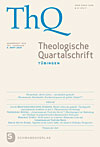archivierte
Ausgabe 4/2021 |


 |
      |
 |
|
|
|
|
 |
|
| Leseprobe 3 |
DOI: 10.14623/thq.2021.4.489–50 |
|
| David Heith-Stade |
| Together at the Lord’s Table: An Eastern Orthodox Perspective |
 |
Zusammenfassung
Der Beitrag versucht, eine orthodoxe Sicht auf die Erklärung „Gemeinsam am Tisch des Herrn“ der Ökumenischen Arbeitsgemeinschaft evangelischer und katholischer Theologen in Deutschland zu geben. Die Erklärung und ihre Schlussfolgerungen werden mit den Grundsätzen der orthodoxen Ökumene verglichen, die in offiziellen Dokumenten der orthodoxen Kirchen formuliert sind. Sie ist auch im Hinblick auf die abgestimmten Erklärungen der internationalen bilateralen ökumenischen Dialoge der orthodoxen Kirchen zu untersuchen.
Abstract
This essay attempts to provide an Eastern Orthodox perspective on the statement Together at the Lord’s Table by the Ecumenical Study Group of Protestant and Catholic Theologians in Germany. The statement and its conclusions are compared with the principles of Eastern Orthodox ecumenism, which were formulated in official documents of the Eastern Orthodox Churches. Additionally, it is examined from the perspective of the agreed statements that were produced by the various international bilateral ecumenical dialogues of the Eastern Orthodox Churches.
Schlüsselwörter/Keywords
Östlich-orthodoxer Ökumenismus; Ekklesiologie; Eucharistie; Interkommunion; Eucharistische Gastfreundschaft; Amt; Apostolische Sukzession
Eastern Orthodox Ecumenism; Ecclesiology; Eucharist; Intercommunion; Eucharistic Hospitality; Ministry; Apostolic Succession
The statement Together at the Lord’s Table (2020), by the Ecumenical Study Group of Protestant and Catholic Theologians in Germany, is a bold and thought-provoking document. Its conclusion is, that the Roman Catholic Church and the mainline German Protestant Churches (especially the Lutheran Churches) have achieved a sufficient differentiated consensus concerning the Eucharist as well as apostolic succession and ordained ministry that justifies in light of the pastoral problem of interdenominational marriages and ecumenical aspirations a mutual participation of the Eucharist (i.e., intercommunion). In this essay, I will try to give an Eastern Orthodox perspective on these issues.
When attempting to evaluate this statement from an Eastern Orthodox perspective, two issues are especially relevant: (a) is it possible to harmonize the conclusion concerning interdenominational Eucharistic fellowship with the principles of Eastern Orthodox ecumenism?; and (b) does the convergence between Roman Catholics and mainline Protestants in Germany on the topics of ecclesiology, Eucharist, and ordained ministry reflect the convergences achieved in the bilateral dialogues of the Eastern Orthodox Churches? It should be noted that the principles of Eastern Orthodox ecumenism reflect Eastern Orthodox ecclesiology and hence there is a certain overlap between these two issues.
Principles of Eastern Orthodox Ecumenism
Concerning the first issue, the simple answer is no. The two most important documents that formulate the principles of Eastern Orthodox Ecumenism are as follows: (a) Relations of the Orthodox Church with the Rest of the Christian World by the Pan-Orthodox Council of Crete (2016); and (b) Basic Principles of the Attitude of the Russian Orthodox Church Toward the Other Christian Confessions by the Jubilee Bishops’ Council of the Russian Orthodox Church (2000). In addition to these two important documents, one should also consult the Final Report of the Special Commission on Orthodox Participation in the WCC (2002) for practical Pan-Orthodox principles of ecumenism.
The official documents that state the principles of Eastern Orthodox ecumenism are less nuanced than the contemporary principles of Roman Catholic ecumenism based on the documents of the Second Vatican Council. Eastern Orthodox ecumenism is based on an exclusivist ecclesiology that unequivocally identifies the Eastern Orthodox Church as the una sancta and true church. The Pan-Orthodox Council of Crete stated the following:
“1. The Orthodox Church, as the One, Holy, Catholic, and Apostolic Church, in her profound ecclesiastical self-consciousness, believes unflinchingly that she occupies a central place in the matter of the promotion of Christian unity in the world today.”
Moreover, the Jubilee Bishops’ Council of the Russian Orthodox Church stated the following:
“1.1. The Orthodox Church is the true Church of Christ established by our Lord and Saviour Himself, the Church confirmed and sustained by the Holy Spirit, the Church about which the Saviour Himself has said: ‘I will build my church; and the gates of hell shall not prevail against it’ (Mt. 16:18). She is the One, Holy, Catholic and Apostolic Church, the keeper and provider of the Holy Sacraments throughout the world, ‘the pillar and ground of the truth’ (1 Tim. 3:15). She bears full responsibility for the proclamation of the truth of Christ’s Gospel, as well as full power to witness to ‘the faith which was once delivered unto the saints’ (Jude 3). [...]
Lesen Sie den kompletten Artikel in der Printausgabe.
|
|
|
|
|
|
|
Anzeigen
|
Mit Anzeigen und Inseraten erreichen Sie Ihre Zielgruppe. Anzeige aufgeben
|
 |
|
Unsere Dienstleistung für Verlage, die Ihr Abogeschäft in gute Hände geben wollen.
|

mehr
Informationen
|
 |
|
| Bücher & mehr |

|
|

